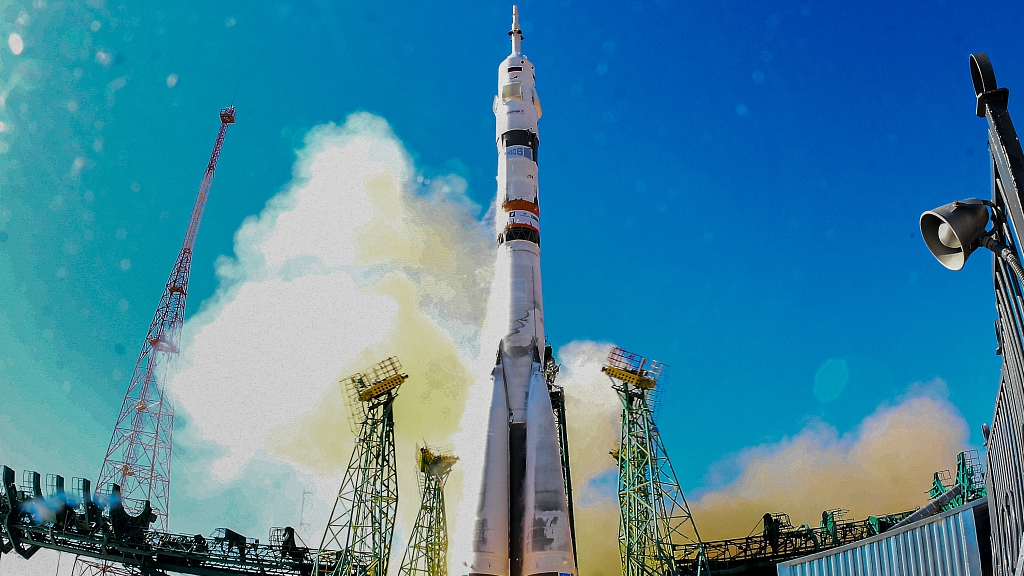
A Soyuz-2.1a rocket booster carrying the Soyuz MS-19 spacecraft blasts off from the Baikonur Cosmodrome, Kazakhstan, May 10, 2021. /CFP
A Soyuz-2.1a rocket booster carrying the Soyuz MS-19 spacecraft blasts off from the Baikonur Cosmodrome, Kazakhstan, May 10, 2021. /CFP
The re-entry capsule of Russia's Soyuz MS-19 spacecraft with three crew members on board will depart the International Space Station (ISS) and land in the steppes of Kazakhstan on Wednesday afternoon, the press service of Russia's space corporation Roscosmos told Russian news agency TASS.
The Russian Soyuz capsule carrying U.S. space agency NASA's Mark Vande Hei and two Russian cosmonaut peers Anton Shkaplerov and Pyotr Dubrov was scheduled to undock from ISS at 10:19 Moscow time and make a parachute landing in central Kazakhstan at around 14:28 Moscow time.
Scheduled parachute landing
According to TASS, the command to undock from the Rassvet module of the Russian ISS segment is expected to be made at 10:19 Moscow time, with the undocking itself expected at two minutes later. The deorbit burn will begin at approximately 13:34 Moscow time.
After that, the unoccupied modules will separate from the spacecraft and burn in dense layers of the atmosphere. Aeroballistic deceleration will begin when the landing capsule enters the atmosphere.
Consequently, a cloud of plasma with a temperature of about 2,000 degrees Celsius will be formed around the vehicle, making any contact with the crew impossible for several minutes.
With the help of parachutes, further deceleration will occur, and soft landing engines will turn on at an altitude of less than one meter. The landing is expected to take place 147 kilometers southeast of Kazakhstan's city of Zhezqazghanat around 14:28 Moscow time.
According to the press service of Russia's Central Military district, the weather at the landing site is expected to be fair with some clouds, with air temperature hovering around six degrees Celsius and visibility of around eight kilometers, TASS reported.
Three crew members
Vande Hei, 55, completing his second ISS mission, will have logged a U.S. space-endurance record of 355 consecutive days in orbit, surpassing the previous 340-day record set by astronaut Scott Kelly in 2016, according to NASA.
Anton Shkaplerov, 50, just ending his rotation as the latest ISS commander, is a veteran of four missions to the orbital outpost, accumulating 708 total days in space, far exceeding Vande Hei's 523-day career tally, according to the U.S. space agency. Shkaplerov began his latest space station stint last October.
Pyotr Dubrov, 40, who launched to the ISS with Vande Hei last April from the Baikonur Cosmodrome in Kazakhstan, will be completing his first spaceflight, sharing 5,680 Earth orbits and more than 150 million miles in space with Vande Hei, NASA said.
The all-time world record for the longest single stay in space was set by Russian cosmonaut Valeri Polyakov who spent more than 14 months aboard the Mir space station before returning to Earth in 1995.
Cooperation amid conflict
The joint U.S.-Russian return flight from ISS was closely watched for signs that escalating tensions between Moscow and Washington over the Russia-Ukraine conflict may have spilled over into longtime cooperation in space between the U.S and Russia.
Earlier, Roscosmos said that it has never given its partners the slightest chance to doubt its reliability, reaffirming that the U.S. astronaut will return to Earth on March 30 as scheduled, according to TASS. It said the ISS crew's safety has always been its top priority.
NASA, for its part, has said that U.S. and Russian ISS crew members were well aware of events on Earth but are working professionally together without tension.
The three returning ISS crew were replaced on the space station by three cosmonauts who flew to orbit on March 18, joining the three remaining U.S. colleagues of Vande Hei and a German astronaut from the European Space Agency.
NASA astronaut Thomas Marshburn assumed command of the ISS on Tuesday. In April, he will hand it over to a Russian cosmonaut.
Read More:
Explainer: Why Russia quitting the International Space Station is no small matter
(With input from agencies)

